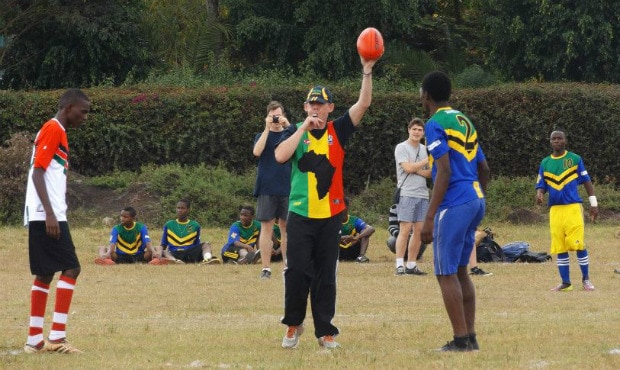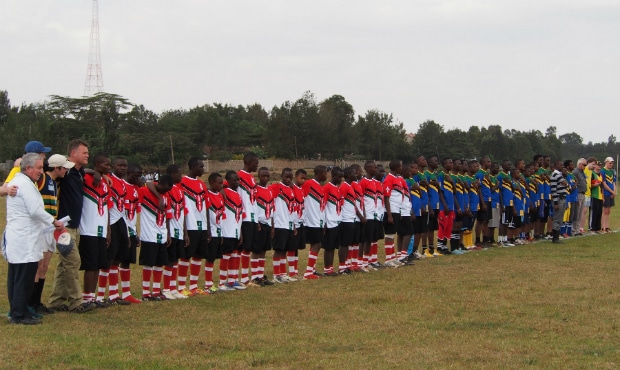The final whistle had blown and the first international game of Australian football in Africa was over. Were there really any losers?
The historic match between players representing Kenya and Tanzania took place in late June in Nairobi, thanks to outreach organisation Zimele and its founder Tom Purcell, a senior teacher at Melbourne's St Kevin's College.
Zimele is an outreach program that has been operating for six years, working in partnership with the Edmund Rice Foundation to build relationships and support the underprivileged in Africa.
Since Purcell first visited Africa seven years ago, he has dreamt of establishing a sporting exchange between the neighbouring countries, but a lack of financial support and tricky logistics forced him to be extremely patient. However patience comes naturally to a busy, full-time working father of 10, as does persistence, and this year it all paid off.
The exchange, which featured football, netball and volleyball, was the first of its kind, and the football match pitted the Kenya Buffaloes of Brother Beausang School, Embulbul, against the Tanzania Simbas of Sinon College, Arusha.
Played on a local paddock with the proper set up of the oval layout, centre-square and everything in between, the game may go down in history as a major stepping-stone for football development in Africa.

"The tackling was ferocious," Purcell said, "Their attack on the ball was the most impressive thing."
Purcell even recounted a player launching towards a pack and heading the ball to a teammate in the goal square who then slotted it from point-blank range.
Although kicking for goal is an area to improve on, the overall ball-handling skills were fantastic and even the unfamiliar skill of handballing was of a high standard.
In the end, the Buffaloes 4.7 (31) beat the Simbas 3.12 (30). Despite three months of preparation by the Simbas, the Kenyans flew home after their mere four-weeks' training to kick all of their goals in the last quarter as Tanzania failed to score.
"The atmosphere was unreal, everyone was getting into it," Purcell said, pointing to a crowd of up to 1000 locals who turned up to watch the game.
People have long known that Africa is a land full of exceptional talent and athleticism and Purcell noted, "They mark well and run like the wind." He named three players who starred, ruckman James Backeru, defender Paul Collins and full-back Erick Mungai, all of whom represented Kenya. Perhaps one day they could become household names in Australian sport.
After AFL.com.au published an article about the exchange, Purcell was contacted by three-time Geelong premiership player David Wojcinski, who works as an indigenous projects coordinator with the Cotton On Foundation and recently travelled to the southern Ugandan town of Mannya to teach boys Australian football.
Wojcinski is hoping to join the exchange in coming years, pushing to include a Ugandan team, an opportunity Purcell is very buoyant about. The sporting exchange has already been confirmed for next year and will continue to grow as an annual event.

Purcell recently attended the International AIDS Conference in Melbourne and says the impact of the terrible disease in Africa remains significant.
"People say it is getting better, but I go back every year and it's not. AIDS in Kenya is a pandemic and women and men aren't being tested," he said.
And the players themselves come from extremely disadvantaged backgrounds. "They live in shacks," Purcell said. "The main purpose of the exchange is empowering students and teaching them resilience, independence and self-esteem. We're using sport as the avenue. Sport creates awareness."
Times may be hard for these kids, but with the help of Zimele a light has been shone on their lives and with the further development of the exchange and more financial support, we may well see some of their lives and their communities turned completely around.
And as for their sporting ability, one day we could all be lucky enough to see someone from East Africa run out onto a full-house MCG in the big league. "It's exciting where this can go," Purcell said. "The game captured the people, that was the best thing."
For more information, visit zimele.org.
Conor Walsh, 19, is a Melbourne student and supporter of Zimele


